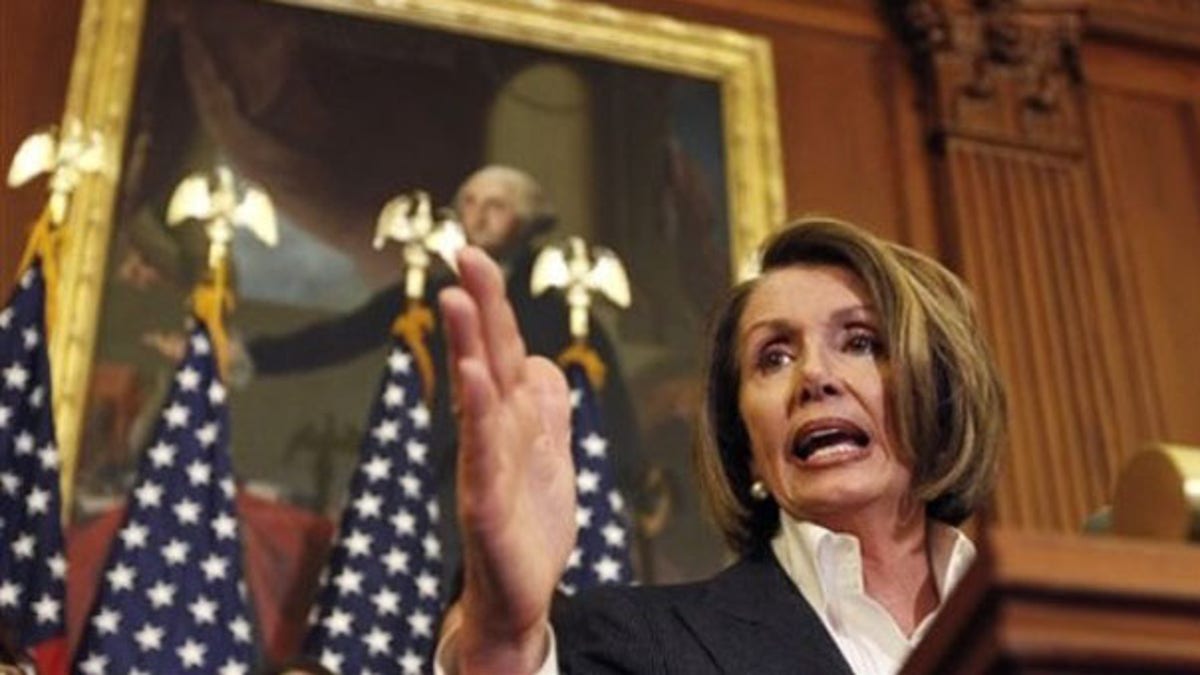
House Speaker Nancy Pelosi speaks at a news conference on Capitol Hill March 15. (AP Photo)
Republicans and Democrats are locked in an unusual battle over how to vote on the health care package as House Republicans try to block Speaker Nancy Pelosi from using a legislative trick that would allow rank-and-file Democrats to vote for the health care bill without really voting for the health care bill.
Senate Minority Leader Mitch McConnell slammed Democrats on the floor Tuesday for even considering the tactic, which he called "extraordinary."
House Minority Leader John Boehner called it "the ultimate in Washington power grabs."
House Republicans plan to introduce a resolution that would require an "up-or-down" vote in the House on the Senate-approved health care plan, to ensure everyone goes on the record as for or against the bill.
But Pelosi and Rep. Louise Slaughter, D-N.Y., chairwoman of the House Rules Committee, are cooking up a plan to pass the original health bill from the Senate side without forcing rank-and-file Democrats to technically go on record in support of it.
Democratic leaders are considering the option because many House Democrats don't want to cast a vote in favor of the Senate bill, which they oppose for numerous reasons. Problem is, the House must pass the Senate bill in order to move on to the package of changes intended to correct all the things about the Senate bill that House members don't like.
Enter the Pelosi tactic, known as a "self-executing rule."
Under this tactic, the House could simultaneously approve the Senate version of the bill while voting on the package of changes. This would "deem" the Senate bill passed, though not directly show members voting in favor of passage.
It may sound murky, but the option is winning favor among Democrats.
"It is one of the ways that's being discussed," House Democratic Whip James Clyburn, D-S.C., told Fox News, rebutting criticism.
"There's been a vote in the Senate. They got 60 votes for this," Clyburn said Tuesday. "This is nothing unusual. There's no trickery here at all."
The maneuver is not rare, though it's not typically used for something so sweeping and high-profile. The House most recently used the tactic to raise the debt limit while simultaneously passing a measure requiring the chamber to pay for the measures it approves.
"We're playing it straight," House Majority Leader Steny Hoyer said. "They used it 30 percent of the time. We used it 16 percent of the time."
White House Press Secretary Robert Gibbs would not say whether President Obama favors the option but appeared to defend it. He called the debate a "legislative process game."
"This week there will be a final vote on health care. ... You're going to know where people are on health care," Gibbs said.
Pelosi reportedly told liberal bloggers Monday that "nobody wants to vote for the Senate bill," and so she's strongly considering the non-vote vote.
"I like it, because people don't have to vote on the Senate bill," she said.
But Republicans were fuming. The consideration of the "self-executing rule" comes after Democrats moved to consider the package of changes under rules that would allow the Senate to pass the bill with just 51 votes, as opposed to the usual 60.
"Anyone who believes they can send this bill to the president without being tarred by it is delusional," McConnell said Tuesday. "Anyone who endorses this strategy will be forever remembered for trying to claim they didn't vote for something they did. It will go down as one of the most extraordinary legislative sleights of hand in history."
House Republican Conference Chairman Mike Pence, R-Ind., called the option "a betrayal of the commitment of every member of this Congress to the American people."
Boehner said in a written statement that Democrats are considering a "legislative ploy that lets Democrats defy the will of the American people while attempting to eliminate any trace of actually doing so.
"It shows you just how controversial this government takeover of health care has become that it takes a controversial maneuver just to vote on it," Boehner said.
























